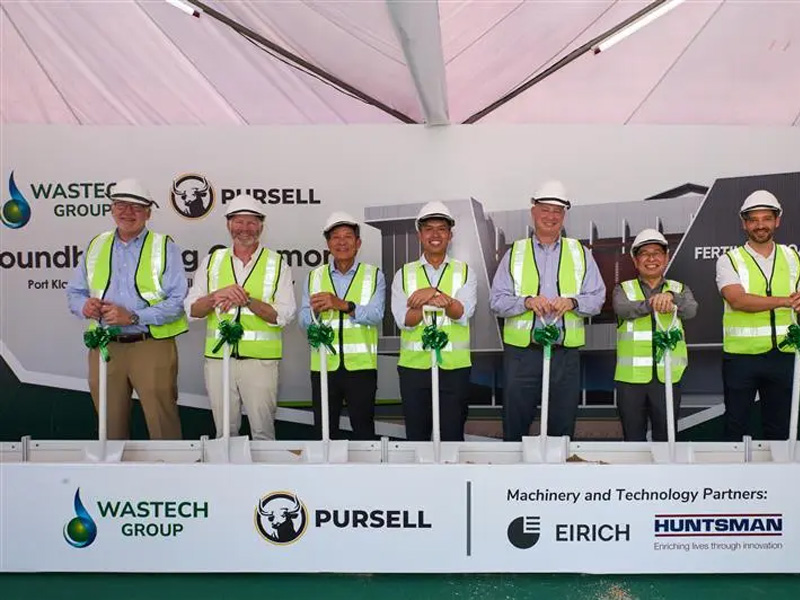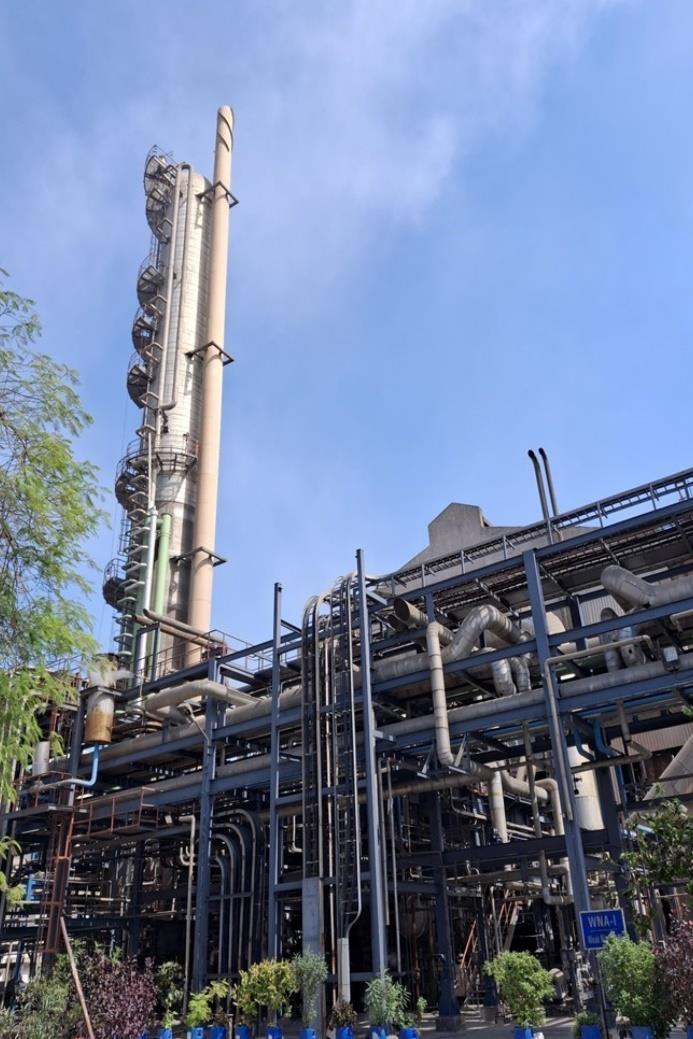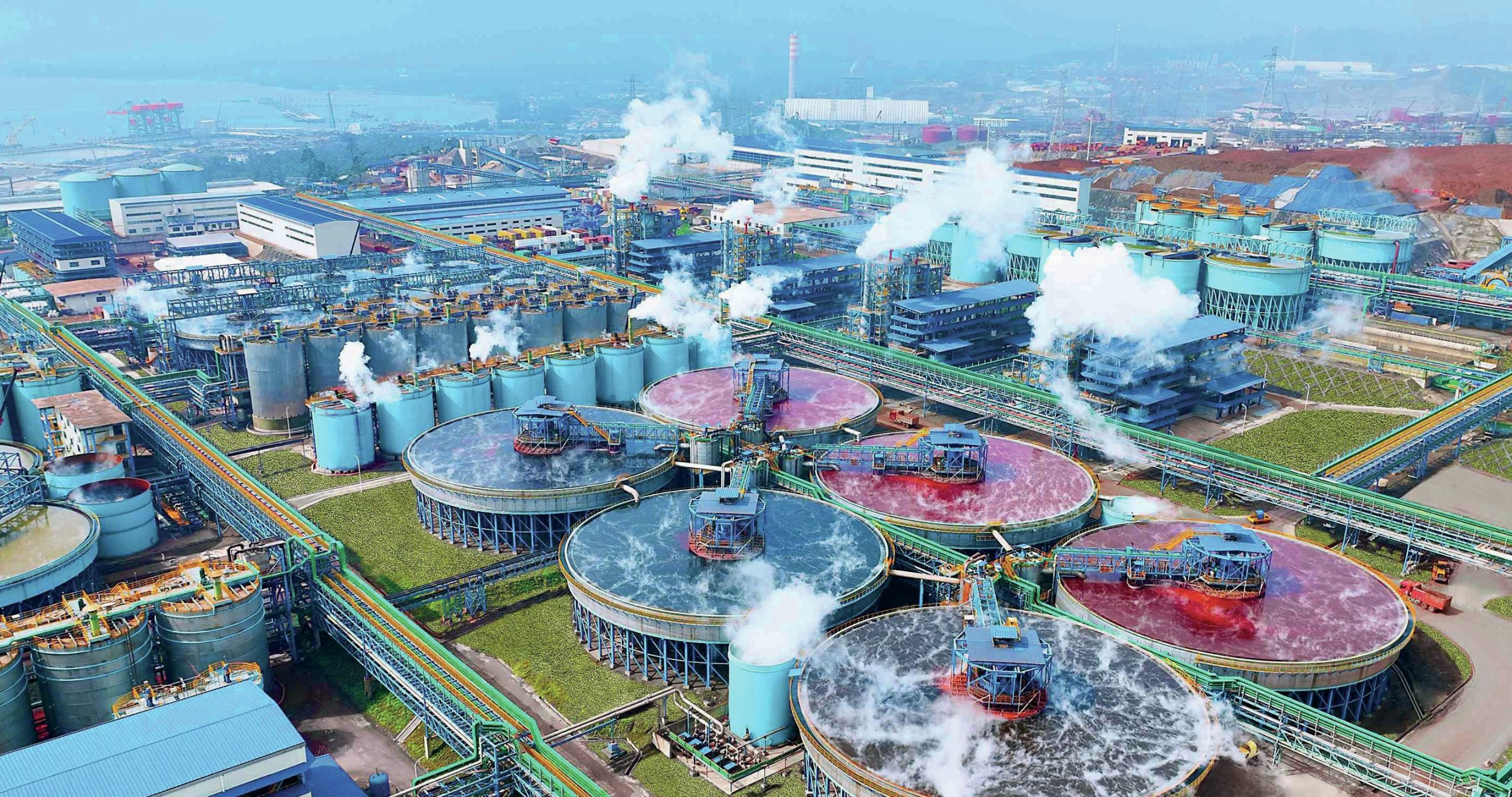Nitrogen+Syngas 369 Jan-Feb 2021

31 January 2021
Syngas News Roundup
Syngas News
CHINA
Contract for five methanol plants
Johnson Matthey (JM) has secured a multiple licence for China’s Ningxia Baofeng Energy Group’s latest project to develop five of the largest single train methanol plants in the world. Located at Baofeng’s Ordos City complex in Inner Mongolia, the five plants each have a planned capacity 7,200 t/d. Under the agreement Johnson Matthey will be the licensor of all five plants and supplier of associated engineering, technical review, commissioning assistance, and catalyst. The plants will take synthesis gas as a feed and use JM radial steam raising converters in a patented series loop. Within the design, there is potential for 1-2% more feedstock efficiency over the life of the catalyst. Thanks to JM’s methanol loop synthesis technology, the plants will provide enhanced energy savings along with low OPEX, CAPEX and emissions. When complete, the plants will represent JM’s 13th operating license in China for a mega-scale plant (>5,500 t/d) and the fourth JM methanol design licensed by Ningxia Baofeng Energy.
“We are deeply proud that Ningxia Baofeng Energy has selected JM yet again as methanol technology provider at their newest and grandest complex”, said John Gordon, managing director of Johnson Matthey. “Our continuing collaboration speaks volumes to their confidence in JM’s expertise and ability to design and deliver large scale plants. Our plant designs and catalysts are recognized the world over for their efficiency, enabling customers to enhance yields and improve the economic and environmental footprint of their plants. It’s an exciting time for both JM and our valued customer so we look forward to this next phase of our partnership”.
Production boost at MTO plant
Meanwhile, also at Ningxia Baofeng Energy, Clariant is celebrating 18 months of installation of its MegaMax 800 methanol synthesis catalyst in the methanol section of the Chinese group’s coke oven gas to olefin project. The 1.5 million t/a methanol unit was loaded for the first time with the catalyst in June 2018. Since then its high performance has enabled Baofeng Energy to increase the plant load to 117% of design capacity, producing 3.7 million metric t/a of methanol for downstream methanol to olefins (MTO) production. Chaoshan Yi, Chief Engineer of Baofeng Energy Group, said, “We were very pleased with the results of the catalyst’s performance, especially the high activity which sets the foundation for the higher yield of the methanol plant.”

Linde expands capacity for hydrogen refuelling stations
Linde and the Dalian Bingshan Group have signed an agreement to establish a joint venture company to manufacture hydrogen refuelling stations in Dalian, Liaoning province, to supply fuel cell-powered vehicles, starting in 2021. Linde will triple its production capacity for hydrogen refuelling stations over the next few years.
“The Asian market has long been one of the pioneers in hydrogen-based mobility solutions. Due to our many years of successful cooperation with our joint venture partner, this is the ideal location for us to expand capacity,” said Dr. Alexander Unterschuetz, Senior Vice President Components, Linde Engineering.
ITALY
Alliance for waste to chemicals projects
Maire Tecnimont subsidiary NextChem, which focuses on the development of projects and technologies for energy transition, has signed a commercial agreement with JFE Engineering Corporation, part of Japan Group JFE, to cooperate on technologies which use waste as a resource to produce advanced fuels, hydrogen, fertilizers and low carbon chemical products. The companies say that the conversion of waste into syngas and the use of this to produce circular hydrogen, advanced fuels and many other key products can contribute to the decarbonisation of production processes and reduce the carbon footprint in the final use phase of products. The companies will collaborate on feasibility studies, turnkey construction, and training of staff in JFE plants in Japan. Based on JFE’s experience NextChem has defined an integrated waste to chemicals technological platform that is ready to be licensed license worldwide.
“The recovery of carbon and hydrogen contained in waste allows us to reduce the use of fossil sources for the production of fuels and basic chemicals,” commented Pierroberto Folgiero, CEO of Maire Tecnimont Group and NextChem. “The collaboration between NextChem and JFE Engineering enhances the know-how of both Groups. Our technological waste to chemical platform is solid, referenced, ready and profitable; it is our response to the… path to a low-carbon economy, to the problem of dependence from abroad of many countries for some basic products of the chemical industry and also to the global problem of recovery of waste fractions currently not recyclable”
NORWAY
Haldor Topsoe and Aker Carbon Capture to cooperate on low-carbon hydrogen
Aker Carbon Capture and Haldor Topsoe have signed a memorandum of understanding with the intention to offer a complete solution for low-carbon hydrogen production. The solution combines Haldor Topsoe’s proven hydrogen process and Aker Carbon Capture’s post combustion carbon capture technology to achieve low-emission and cost-effective production of ‘blue’ hydrogen – a clean energy carrier with a wide array of applications in industry and as a fuel.
The companies say that decarbonising the existing hydrogen market by adding carbon capture is a key to unlock the emerging hydrogen market in Europe, and the collaboration aims to accelerate this process. The two companies intend to enter into a formal cooperation agreement in early 2021 and approach market opportunities. The European Union foresees investments of e11 billion for retrofitting half of the existing European hydrogen plants with carbon capture and storage before 2030.
“The collaboration with Aker Carbon Capture is an exciting opportunity to support customers in lowering their emissions from hydrogen production. Haldor Topsoe is a world leader in technology to produce hydrogen, and we are determined to lead the transition towards significant reductions in carbon emissions in this field and others,” said Amy Hebert, Chief Commercial Officer of Haldor Topsoe.
UNITED STATES
Grön Fuels selects Topsoe technologies for low carbon complex in Louisiana
Grön Fuels, developer of a renewable diesel and jet fuel facility at the port of Greater Baton Rouge, has selected key technologies from Haldor Topsoe, including HydroFlex™ hydrotreating and H2bridge™ hydrogen technologies, including an option to capture up to 1.0 million t/a of CO2 for carbon sequestration in suitable deep saline aquifers located below the project site. The facility will produce renewable diesel from non-fossil feedstocks such as soybean and canola oils, distillers corn oil, tallow, used cooking oil, and future feedstocks such as bio-crudes. Following the expected completion of the first phase of the complex in 2024, the plant will produce 60,000 bbl/d of renewable diesel, including a permitted jet fuel option. A final investment decision for the $1.25 billion first phase of the project is expected in 2021. Once completed, it would be the largest renewable fuel site in the world.
The integration of the H2bridge and HydroFlex processes would enable Grön Fuels to produce renewable bio-hydrogen equivalent to the production of a 1,000 MW hydrolyser plant at a fraction of the cost. The design flexibility to include bio-carbon capture and sequestration (CCS) to the project is added to pursue negative carbon intensity renewable fuel production. Bio-hydrogen not used for diesel production will be made available for purchase by third parties for lowering the CO2 emissions of power production, industrial processes, or transportation.
MoU on green hydrogen plant
Maire Tecnimont subsidiary NextChem has signed a memorandum of understanding with Enel Green Power to support the production of green hydrogen via electrolysis in the United States. Enel will leverage NextChem’s hydrogen technology and engineering expertise to grow its green hydrogen business in the US. The project, which is expected to be operational in 2023, will convert renewable energy from one of Enel’s solar plants in the US into green hydrogen to be supplied to a bio-refinery. Under the agreement, NextChem will act as technology and engineering partner and full turnkey EPC contractor, providing Enel Green Power with the necessary technical assistance in relation to the development and implementation of the project.
Pierroberto Folgiero, Maire Tecnimont Group and NextChem CEO, commented: “We are really proud to be Enel’s partner of choice in this industrial initiative, which enhances our group’s expertise in hydrogen chemistry and production of green hydrogen from solar renewables and represents a relevant step in the development of our green hydrogen initiatives.” “This new partnership is the latest milestone in the Enel Group’s commitment to promoting the development of green hydrogen” said Salvatore Bernabei, CEO of Enel Green Power. “We are actively scouting for opportunities in this segment in several parts of the world, both in Europe and in the Americas, and we look forward to joining forces with partners such as Maire Tecnimont to make the most of the significant potential that green hydrogen represents for the decarbonisation of hard-to-abate sectors.”
Federal funding for hydrogen development
The US Department of Energy’s Office of Fossil Energy is making $160 million in federal funding available to help move the country’s fossil-fuel and power infrastructure towards decarbonised energy and commodity production. The funding, for cost-shared cooperative agreements, is aimed to develop technologies for the production, transport, storage, and utilisation of fossil-based hydrogen, with progress towards net-zero carbon emissions.
Program areas include: net-zero or negative carbon hydrogen production from modular gasification and co-gasification of mixed wastes, biomass, and traditional feedstocks; solid oxide electrolysis cell technology (SOEC) development; carbon capture; advanced turbines; natural gas-based hydrogen production; hydrogen pipeline infrastructure; and subsurface hydrogen storage.
SWEDEN
Perstorp plan to produce sustainable methanol
Speciality chemicals producer Perstorp is developing a plant to produce sustainable methanol from a wide variety of recovered end-of-life streams, combined with hydrogen from electrolysis, and a large scale, carbon capture and utilisation (CCU) unit. The Project AIR methanol plant will be unique in combining CCU and a gasification process where CO2 , residue streams, renewable hydrogen and biomethane will be converted to methanol. Perstorp plans to do this in cooperation with Fortum, Uniper and Nature Energy.
Project AIR aims to substitute all 200,000 t/a of fossil fuel-based methanol that Perstorp currently uses in Europe as a raw material for chemical products. The project would support companies downstream in the value chains in their efforts towards renewable/circular materials, reduced carbon footprints, and in their ability to offer sustainable, affordable products. If completed, it would reduce greenhouse gas emissions by about 500,000 t/a.
If the required funding is granted, the goal is to start producing sustainable methanol in 2025 at Stenungsund. For-tum and Uniper will supply renewable hydrogen from a new electrolysis plant, while one of the world’s largest producers of biogas, Nature Energy will seek to supply biogas to Project AIR.
“This innovation would both optimise the use of existing technologies whilst building something completely new, as well as demonstrating carbon capture and utilisation, using captured CO2 as a raw material. It would be a concrete example of the transition towards a circular economy and of how significant CO2 emission reductions could be achieved by utilising existing resources and closing loops. This would be an important step for us to achieve our goal of becoming finite material neutral,” said Perstorp’s president and CEO, Jan Secher.
DENMARK
Methanol fuel cell production begins
Methanol fuel cell developer and manufacturer Blue World Technologies says that it has begun a limited production run of fuel cells as the first step in commercialising their own methanol fuel cell technology. The company, founded only in October 2018, has nevertheless managed to build up an order book that reflects the considerable market demand for methanol fuel cells. The limited production run is intended to be a precursor to a scale up to full production of 2-5,000 units per year, with the aim of reaching full-scale commercial production capacity of 50,000 fuel cell units within three years.
Blue World sees methanol fuel cell technology’s potential as being in markets such as maritime, heavy-duty, stationary, and passenger vehicles. The fuel cells run on methanol which is easy to handle, making refuelling convenient as well as making it possible to integrate and reuse existing infrastructure. Blue World uses high temperature PEM-technology combined with methanol reforming. The combination ensures a simple system design with high conversion efficiency and compliance with automotive design requirements.
BELGIUM
CF Industries joins Hydrogen Council
CF Industries Holdings has joined the Hydrogen Council, a global CEO-led initiative that brings together leading companies with a united vision and long-term ambition for hydrogen to foster the clean energy transition. The Company will serve as a steering member of the council. In addition to joining the Hydrogen Council, the company has announced an initial green ammonia project at the company’s Donaldsonville Nitrogen Complex to produce approximately 20,000 t/a of green ammonia. CF will install a state-of-the-art electrolysis system to generate carbon-free hydrogen from water that will then be supplied to an existing plant to produce green ammonia. Additionally, CF Industries is developing carbon capture and storage (CCS) and other carbon abatement projects across its production facilities that will enable CF to produce low-carbon ammonia.
“CF Industries shares the Hydrogen Council’s vision that hydrogen has an essential role to play in the clean energy transition,” said Tony Will, president and chief executive officer, CF Industries Holdings, Inc. “We believe that low-carbon ammonia is a critical enabler for the storage and transport of clean hydrogen to help meet the world’s energy needs, which is why we have committed to decarbonise the world’s largest ammonia production platform. We look forward to working with Hydrogen Council members to support the acceleration and deployment of hydrogen solutions globally.”
TRINIDAD AND TOBAGO
Titan idled “indefinitely”
Methanex says that it expects its 875,000 t/a Titan methanol facility on Trinidad to remain idled indefinitely. As a result, the company has made the decision to restructure its Trinidad operations to support a one-plant operation and reduce its Trinidad workforce by approximately 60 jobs. Methanex says that this is because it has not been able to reach an agreement for an economic long-term natural gas agreement with the government. In a press statement, the company added: “given that the economic recovery path remains uncertain we believe it is prudent to reduce costs while continuing our efforts to secure longer-term gas supply”. The neighbouring Atlas methanol facility, in which Methanex has a 63% stake, will continue to operate, as it is has a separate natural gas supply agreement which expires in 2024.
John Floren, president and CEO of Methanex, commented, “We remain committed to doing business in Trinidad and Tobago and we believe that we will be able to secure an economic longer-term natural gas agreement for Titan in the coming years. Our operations in Trinidad are well located to supply global methanol markets and are an important component of our global production network. We are taking the necessary steps to maintain Titan to ensure a safe and efficient restart of the plant when a longer-term gas agreement is reached.”
FRANCE
Funding sought for green hydrogen feed
Total and Engie have unveiled plans to build a green hydrogen side feed for Total’s biodiesel plant in the south of the country. The project is hoped to be up and running in 2024, provided that the companies secure subsidies to make the project viable. The project partners envisage building a solar farm with a capacity of more than 100 MW and a 40-MW electrolyser at Total’s biofuel plant in La Mede. The facility would produce 5 t/d of hydrogen, which would allow Total to avoid 15,000 t/a of CO2 emissions a year.
UNITED ARAB EMIRTES
Abu Dhabi to become hydrogen exporter
Abu Dhabi has agreed a deal to produce and export hydrogen as fuel, according to the government. State owned Abu Dhabi National Oil Co (ADNOC), state investor Mubadala and state-owned holding company ADQ have signed a memorandum of understanding to establish the Abu Dhabi Hydrogen Alliance, a statement said. The plan is to produce both green hydrogen and ‘blue’ hydrogen, the latter from natural gas, to export to emerging international markets.
UZBEKISTAN
GTL project slips to July
Uzbekistan has set a new deadline for the commissioning and start-up of its $3.6 billion gas to liquids (GTL) project in the Kashkadarya region after failing to bring it online last year due to the Covid19 pandemic. According to project operator Uzbekistan GTL, the plant is now set to come into operation in July 2021, with construction said to be 94% complete as of January 11th. Construction efforts at the plant came to standstill in the middle of last year after rising numbers of Covid19 infections prompted the evacuation of thousands of workers, and a push from authorities to move faster with the project met with resistance from workers who staged a protest in October over prolonged shifts. At full capacity, the GTL plant is set to process about 3.6 bcm of gas, produced at the Shurtan field and purified at a nearby gas chemical facility, operated by Uzbekneftegaz.
CANADA
Shell buys into waste-to-fuels plant
Shell is to take a 40% stake in Enerkem’s new waste to fuels plant at Varennes, Quebec. The $700 million plant will use Enerkem’s processing technology to convert 200,000 t/a domestic waste and wood waste into 125 million litres of chemicals and fuels. The first phase is scheduled for commissioning in 2023. The plant will also take 11,000 t/a of hydrogen and 88,000 t/a of oxygen from a new 90 MW electrolysis plant which is being built nearby by Hydro-Québec. The waste is sorted, shredded and dried, than passed through a fluidised bed gasifier to generate syngas, which is cleaned and converted to methanol and ethanol. Other partners in the project include methanol and ammonia producer Proman, and oils sands developer Suncor.
The plant is the fourth that Enerkem has under development. It has a 100,000 t/a waste processing facility being commissioned in Edmonton, Canada; a 360,000 t/a facility awaiting a final investment decision for construction in Rotterdam; and a 400,000 ta plant also awaiting investment decision for Tarragona, Spain.






